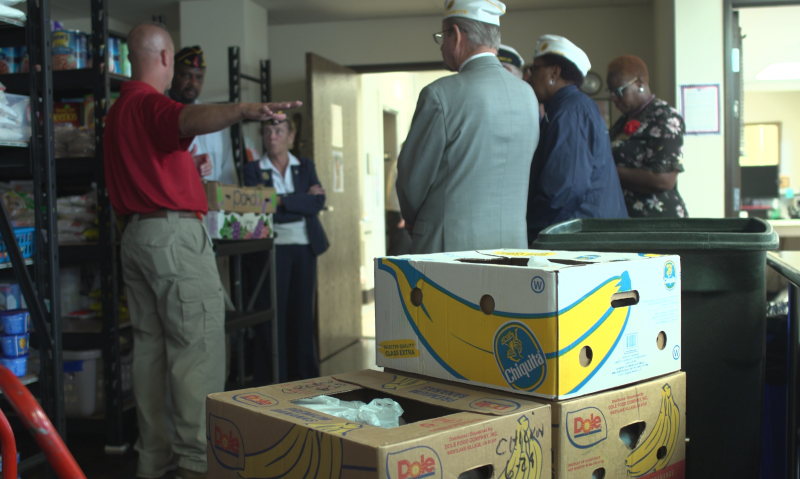
Members of The American Legion's Veterans Employment and Education Commission get tour of Indiana's largest homeless veterans non-profit.
Three days after a group of American Legion Family volunteers spent the morning cleaning up one of the Hoosier Veterans Assistance Foundation’s facilities, members of the Legion’s Veterans Employment and Education Commission (VEED) were given an up-close briefing on HVAF’s mission.
The 26-year-old foundation is the state’s largest non-profit dealing with homeless veterans and in 2018 assisted more than 1,200 veterans through case management, housing, employment, and its food and clothing pantries. Approximately 700 of those veterans are homeless, while the other 500 are in need of some other kind of assistance.
Thirty-five of the 55 full-time employees serve as case workers for veterans. “Those are our bread and butter,” said Bernie Kruse, HVAF’s vice president of Support and a 32-year U.S. Army veteran. “Those are my heroes because they are the people working with the veterans. They break down barriers. Every vet coming in has a different story, background, experience that we need to try to break through. Some of them are battling behavioral health. Some are battling drug addiction. Some are just down on their luck or dealt a bad hand and just need a little pick-me up.
“The case workers … they get assigned a vet and they just start digging in and breaking these barriers down, getting them hooked up: getting them a place to stay, getting them food, getting them clothing, get them employment services – all those things we do here within HVAF.”
HVAF also offers both a food pantry – with both perishable and non-perishable items – and a clothing pantry for both men and women. In 2018 the food pantry alone distributed more than 26,000 pounds of food.
The commission also got the opportunity to view one of HVAF’s 17 transitional housing units, where veterans have their own living quarters and share a common area. Each veteran has 90 days at the facility, though they can get an extension if they show they are working toward moving into their own permanent housing.
At one of those 17 properties, commission members heard from HVAF Peer Counselor Fred Young, a U.S. Army veteran who himself battled both alcohol and drug addiction, eventually becoming homeless for five years, but for the past 14 years has assisted veterans in their own battles.
Young draws on his own experience when helping the veterans in the HVAF program. “I did every drug that I can think of. I came close to death a couple times,” he said. “I’m dealing with clients who have the same issue. I was hired on to help them get back on their feet in a way to show by example how I did what I did to get back on my feet. I bring that to this community.
“It’s all about saving lives. We’re trying to eliminate every single excuse that they try to have. Being a recovering (addict), you can come up with some good ones.”
VEED Commission member James Fratolillo said opportunities to meet with organizations like HVAF are critical to the commission’s mission. “It makes it real all over again,” he said. “You see how it actually works. You can read about it, but when you see it – and you get the stories like we heard today – I think it’s important for us to stay aware.
“And it’s a constant vigil. We have great legislation. We have resolutions. We have a lot of good stuff … but you see it happening here. It’s really nice.”
Audrey Hopkins Long, HVAF’s Volunteer Coordinator, said efforts like the Legion Family assisting in cleanup of one of its facilities is one example of how veterans service organizations assist HVAF’s mission. “A lot of (The American Legion) posts do amazing drives for us: food and clothing,” she said. “We do get a lot of good volunteers come through, but it’s more behind-the-scenes, offsite organized drives. And they just show up sometimes with a truckload of food for us that we’re able to restock our pantry with.”
HVAF President Brian Copes said he is passionate about the mission of HVAF but looks forward to the day the foundation no longer is necessary. “We would hope and pray, as I think everyone would, for the day that comes when we work ourselves out of business and there are no more homeless vets,” he said. “But until that day comes, I’m going to posture to meet as many vets’ (needs) wherever we can and whatever way we can for as long as we have to. When that day approaches, I’ll be happy to lock the doors and give the keys to somebody else.”
- Homeless Veterans

